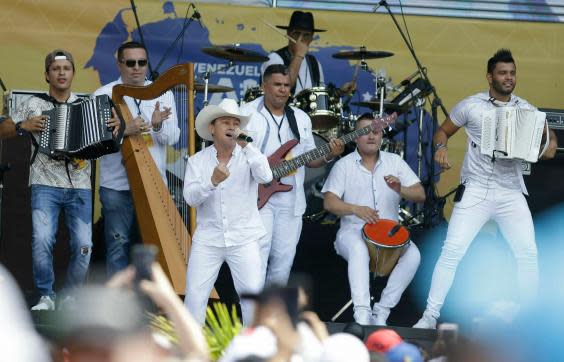Venezuela Aid Live: International proxy war played out in duelling concerts on the border
Just hours before the music festival is due to open, thousands continue to cross into Colombia from Venezuela on foot draped in their vibrant tricolours and hats which quickly identify them as excited concertgoers.
Many hope to get a good spot to catch the lineup of some of the biggest names in the Colombian, Venezuelan and pan-Latin American music scenes, but they are expecting something more than just pop tunes and some fun.
“We aren’t here for the music”, says 60-year-old Doris Santamaría, who walked four kilometres from neighbouring San Antonio, Venezuela, to attend the event accompanied by her two close friends, Gladys and Marlenys.
“We are here for Venezuela’s freedom, the happy, wonderful Venezuela of old, not what is now the most ruined country in the Americas”.
British billionaire Richard Branson organised the Live Aid-esque event seemingly out of nowhere on 15 February, a week after the Venezuelan military defiantly blocked off the Tienditas bridge which was intended to be used to deliver aid into Venezuela from Colombia with two shipping crates and an oil tanker.
It is taking place at the origin of the international standoff with 30 artists from across Latin America performing on the bridge, including Colombian pop legend, Carlos Vives, and reggaeton star, Maluma.
The wealthy entrepreneur said the event will raise $100m (£76m) to help alleviate dire living conditions in Venezuela where food and medicine shortages are widespread and hyperinflation of over a million percent makes even the most basic items unobtainable.
But the move is also part of the international power struggle over Venezuela which continues unfolding in the humid Colombian border city of Cúcuta. Branson has said he hopes the initiative will force Maduro’s hand and break the aid impasse.
We are here for Venezuela’s freedom, the happy, wonderful Venezuela of old, not what is now the most ruined country in the Americas
Doris Santamaría
Alongside the Dutch Caribbean island of Curacao, and Rohaima, Brazil – which had its border with Venezuela closed by Maduro on the eve of the festival – it was chosen by Juan Guaido’s US-backed coalition as one of three launch points for aid into Venezuela, against Nicolas Maduro’s wishes. Maduro denies the existence of a humanitarian crisis and says Venezuelans “are not beggars”.
Guaido reinvigorated the previously dormant opposition when he invoked Venezuela’s national constitution to declare himself the country’s rightful president on 23 January.
A month later, he’s hoping that thousands of Venezuelan volunteers dressed in white will carry aid to the border, forcing a difficult decision upon the military: obey Maduro and deny people the food and medicine they desperately need – potentially sparking conflict – or let the aid in and undermine the military backing which the dictator is increasingly dependent upon.

Several international aid organisations such as the Red Cross have distanced themselves from the plan which they say is too political to be classed as humanitarian.
“They are playing with the lives and suffering of Venezuelans”, said Ariel Avila, subdirector of Pares, a research and peace advocacy group in Bogota which denounced the concert for being a political strategy to provoke tension and confrontation at the border.
On the eve of the initiative – which the opposition hopes will mark a conjuncture for socialist Venezuela’s future – there will be no shortage of volunteers to recruit from in the area as thousands pour in to Colombia, hopeful of music and political change.
“There is no one particular artist that I want to see – I am here to force Maduro out. Change is coming”, says Dario, a cheery 23-year-old university student, accompanied by his classmates who are prepared for a long day in the blistering sun thanks to their hats and aviator sunglasses.
But while young and old gather to dance, sing and protest, in adjacent San Antonio, Venezuela, there is another festival taking place just on the other side of the bridge.
And rather than revolution, attendees of the three-day Hands Off Venezuela Festival will be calling for stability and an end to alleged foreign intervention in the nation’s affairs.
The Venezuelan government announced the event in opposition to Venezuela Aid Live and the wider western relief efforts which pro-Maduro “Chavistas” say are a Trojan horse for a US-led invasion.
Venezuelan information minister Jorge Rodriguez has also pledged to distribute food to 20,000 Colombians in Cucuta to alleviate the “real humanitarian crisis”. Guaido, who made his way to the Venezuelan-Colombian border on the eve of the concert, called the reaction “desperate”.
Maduro says he is currently considering sealing the border with Colombia to prevent the “provocation” and on Friday morning videos from Colombia’s migration authority showed the military reinforcing the makeshift barricade in the middle of Tienditas bridge by welding the shipping crates to the metal structure.
Colombia’s migration officials are concerned that closing the borders could exacerbate the already acute suffering of the thousands of Venezuelan migrants who pour into Colombia every day seeking basic food, supplies and refuge. The deployment of Venezuelan tanks and missiles to the border has also increased tensions.
But concertgoers are determined the situation remains peaceful.
Douglas Cáceres, 37, from the state of Táchira, Venezuela, weaves through the festival crowds with his two year old son on his shoulders: “We’re not going to let them [Chavistas] ruin our fun – we are all going to have a good time.”
“Today is going to be peaceful and tomorrow the aid is going to be let in.”

 Yahoo News
Yahoo News 